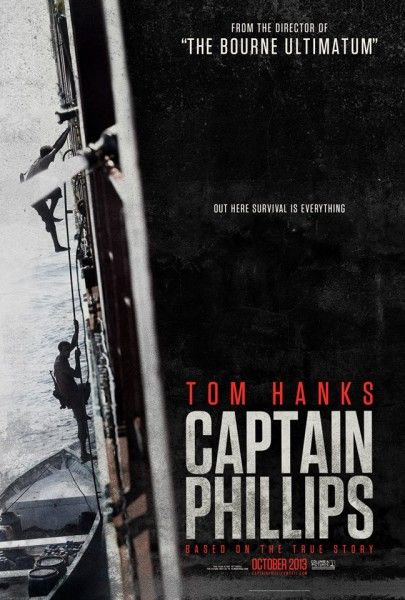In the past, director Paul Greengrass has demonstrated a unique and incredible ability to use a documentary-like style that captures the immediacy of a real-life event without ever feeling like a heavy-handed, exploitative dramatization. Greengrass attempts to bring this approach to his new film, Captain Phillips, but instead of focusing on an event that changed the course of a country, he tries to keep the focus on two men. Unfortunately, he has no room to maneuver, and his fidelity to Richard Phillips’ story handcuffs the film into a cold procedural. Strong performances from the lead actors as well Greengrass’ intelligent depiction of neglected people helps draws us in, but the film tries too hard to play up the “thrilling” action, which only highlights how little investment we have in the hostage and his captor.
In April 2009, Somali pirates attacked the cargo ship Maersk Alabama. Captain Richard Phillips (Tom Hanks) valiantly tried to protect his crew, and went through the procedure of contacting the necessary authorities, managing the situation, and staying calm under pressure. Captain Phillips goes beyond the headlines by expanding the story to the lead Somali pirate, Muse (Barkhad Abdi) and Muse’s crewmembers Elmi (Mahat M. Ali), the young Bilal (Barkhad Abdirahman), and the volatile Najee (Faysal Ahmed). We also see the authorities who were drawn in to manage the situation.
Greengrass’ previous films surrounding true events—Bloody Sunday and United 93—both carried an air of tragedy, and they were remarkable in part because they allowed us to see the people involved as more than just pieces moving through history. They humanized an event that had become boiled down to history books and headlines. I imagine Captain Phillips works better if the viewer goes in knowing almost nothing about the story because while it may be noteworthy, it can’t build to anything bigger than the fate of two men, and Greengrass’ loses sight of them because he’s more focused on their movements than their emotions. Bloody Sunday and United 93 use big casts and a series of glances to make the story come to life, while Captain Phillips is cold and removed even though it provides a close-up on two people.
I’m ambivalent about casting Hanks on the lead role. Again, comparisons to Bloody Sunday and United 93 are inevitable because they have the same director who used the same style, and both of those movies don’t have stars. There’s no distraction, and it’s a bit jarring to see him put on an accent so he can better impersonate a person the public has mostly forgotten (that’s not to be dismissive of Phillips; it’s just the natural outcome of a 24-hour news cycle). Still, his natural talent eventually draws us in to the character’s mix of fortitude and understandable fear. However, newcomer Abdi upstages the Oscar-winning actor. His expressive eyes convey a man who is completely in control even though most of the world considers him as nothing more than a hazard. The best part of Captain Phillips is how Greengrass reminds us that Somali pirates are operating out of survival, and they badly need these dangerous jobs. Abdi’s commanding performance provides a constant and potent reminder of a marginalized people.
Sadly, the movie pays more attention to shuffling them through the events of the hijacking. Once the pirates board the Alabama, the film is all about propulsive action, and rarely makes us consider the people involved. Everyone is going by the book, and even Phillips’ most heroic action to protect his crew lacks an emotional punch. The human emotions are lost in Greengrass’ efforts to hype up the action with Henry Jackman’s relentless score, Barry Ackroyd’s claustrophobic cinematography, and lots of shouting from the actors. Everything is loud, so hardly anything stands out. The film intends for the action to be breathless, but instead it’s just exhausting.
Captain Phillips is a lesser version of Greengrass’ historical dramas and his Bourne blockbusters. The template Greengrass brought to Bloody Sunday and United 93 doesn’t work for this relatively small story. The Bourne movies impressively snuck in political commentary, but here the action dominates almost any attempt to weave in thoughtful observation. Captain Richard Phillips displayed astounding heroism in protecting his crew from pirates, but Greengrass’ approach and past work makes Phillips’ actions feel like nothing more than rah-rah action with the human emotions struggling to be heard over all the shouting.
Rating: C




